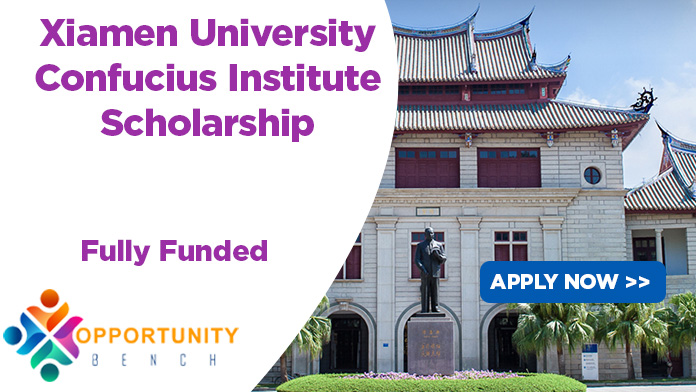The Xiamen University Confucius Institute Scholarship, sponsored by the Chinese Language Council International (Hanban), offers international students a fully funded opportunity to immerse themselves in Chinese language and cultural studies at one of China’s most prestigious academic institutions. For the 2025-2026 academic year, this scholarship continues to serve as a gateway for global learners to deepen their understanding of Chinese language, history, and traditions while experiencing life in one of China’s most vibrant coastal cities.
An Overview of the Confucius Institute Scholarship at Xiamen University
Xiamen University (XMU), established in 1921, stands as a beacon of academic excellence in China. Recognized as a Double First-Class University, XMU combines rigorous academic programs with a stunning campus environment, making it an ideal destination for international scholars. The Confucius Institute Scholarship specifically targets students passionate about Chinese language acquisition, cultural exchange, and academic advancement in related fields.
The scholarship is divided into several categories to accommodate different academic needs and durations:
- One-Academic-Year Study (11 months): Designed for intensive Chinese language and cultural studies, this program runs from September 2025 to July 2026 and is ideal for students seeking comprehensive immersion.
- One-Semester Study (5 months): Available for either the spring (February to June) or fall (September to January) semester, this option suits those with shorter-term academic goals.
- Four-Week Study Programs: These intensive summer or winter sessions focus on language training and cultural activities, including field trips and hands-on experiences in traditional Chinese arts.
Comprehensive Scholarship Benefits
Recipients of the Confucius Institute Scholarship enjoy a fully funded academic experience, which includes:
- Full tuition waiver for all registered courses, ensuring no financial burden for academic enrollment.
- Free on-campus accommodation in international student dormitories, providing a comfortable and convenient living environment.
- Monthly living stipend ranging from CNY 1,400 to CNY 2,500, depending on the program level, to cover daily expenses.
- Comprehensive medical insurance, guaranteeing access to healthcare services throughout the study period.
- Cultural experience fund, which supports participation in extracurricular activities, excursions, and traditional workshops.
Additionally, the university offers airport pickup services, orientation programs, and language partner initiatives to help students transition smoothly into academic and social life in China.
Eligibility Criteria for Applicants
To qualify for the Confucius Institute Scholarship, candidates must meet the following requirements:
- Nationality: Applicants must hold non-Chinese citizenship and be in good health.
- Academic Background:
- For non-degree language programs, a high school diploma or equivalent is required.
- For degree programs, applicants must meet Xiamen University’s undergraduate or postgraduate admission standards.
- Age Restrictions:
- Chinese language students must be between 16 and 35 years old.
- Degree-seeking applicants should be under 45 for master’s programs and under 50 for doctoral programs.
- Language Proficiency:
- Beginner-level applicants need no prior Chinese language experience.
- Intermediate and advanced tracks require HSK 3 or HSK 4 certification, respectively, along with an HSKK (oral proficiency) score.
Step-by-Step Application Process
Applying for the Confucius Institute Scholarship involves several key steps:
- Online Registration (March 1 – May 31, 2025):
- Create an account on the Confucius Institute Scholarship website.
- Complete the application form with accurate personal and academic details.
- Document Preparation:
- Submit notarized copies of the highest academic diploma and transcripts.
- Provide a detailed study or research plan (minimum 400 words).
- Include two recommendation letters from academic or professional referees.
- Attach HSK/HSKK score reports (if applicable).
- Submit a physical examination record to confirm good health.
- Institutional Nomination:
- Applicants must be recommended by a Confucius Institute or, in countries without one, by the Chinese embassy or consulate.
- Review and Admission (June – July 2025):
- Applications undergo preliminary review by Xiamen University before final approval by Hanban.
- Successful candidates receive admission notifications by late July 2025.
Academic Programs and Cultural Opportunities
Xiamen University offers a diverse range of programs under this scholarship:
- Chinese Language and Culture Studies: Intensive courses in Mandarin, calligraphy, traditional painting, and Chinese philosophy.
- Degree Programs: Bachelor’s, Master’s, and PhD options in Chinese Linguistics, Teaching Chinese to Speakers of Other Languages (TCSOL), and related fields.
Beyond academics, students engage in cultural excursions to Gulangyu Island, Fujian Tulou (UNESCO sites), and local festivals, enriching their understanding of China’s heritage.
Why Choose Xiamen University?
- Academic Excellence: Renowned faculty and innovative teaching methods ensure high-quality education.
- Vibrant Campus Life: A picturesque seaside campus with modern facilities and a welcoming international community.
- Career Advantages: Graduates gain globally recognized credentials and access to a vast alumni network.
The Xiamen University Confucius Institute Scholarship 2025-2026 represents an extraordinary opportunity for students worldwide to pursue Chinese studies in a fully funded, culturally rich environment. With its comprehensive benefits and prestigious academic setting, this scholarship is a transformative experience for aspiring sinologists and language educators.
Prospective applicants should begin preparing their materials early and seek nomination from their local Confucius Institute. For further details, visit the official Confucius Institute Scholarship website or contact Xiamen University’s International Student Office.

